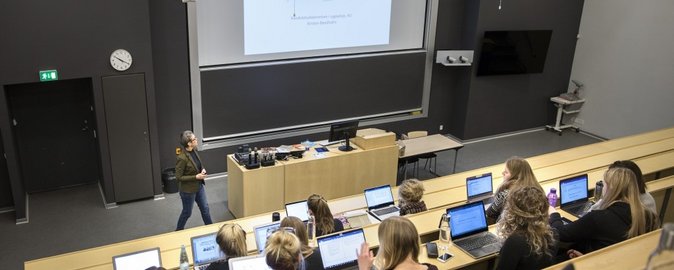- Education
-
Research
Current research
Talent
-
Collaboration
Businesses
Government agencies and institutions
Alumni
-
About AU
Organisation
Job at AU
Following a thorough vision process, the new academic regulations for the degree programmes in sport science, nursing and public health science, among others, have now been approved. The academic regulations include changes to both the structure of the degree programmes and also their courses and elective courses. The goal is to prepare graduates in the best possible way for the labour market of the future.
2020.02.20 |

Director of Studies Kirsten Beedholm teaches, among other things, on the new APN track, which is one of the new initiatives implemented in accordance with the vision process. Photo: Lars Kruse/AU.
Clearer educational profiles, greater methodical and theoretical emphasis, focus on internationalisation and opportunities for part-time study. These are some of the changes that coming students at Health can look forward to.
"Neither the Bachelor's or Master's degree programme in sport science are undergoing a revolution with the new academic regulations. But we are strengthening the degree programmes in a number of areas, both in terms of structure and content, for example by clarifying the various paths and tracks through our degree programmes in our course programme,” says director of studies and chair of the board of studies for sport science Kristian Raun Thomsen.
Over the past two years, the board of studies, the studies administration, students, teaching staff and employers, have been working on anticipating the competences that will be in demand when graduates begin applying for jobs after completing their degree programmes.
"On the Master's degree programme in nursing, we have divided the degree programme into two different tracks – Nursing Science and Advanced Practice Nursing. In addition, the students will be able to take the Master's degree programme on the Master's degree programme for working professionals programme, so they can maintain their affiliation with the labour market while they’re studying. This gives both us and the students a lot of opportunities," says Kirsten Beedholm. She is director of studies and chair of the board of studies for the Master's degree programmes in health science.
While the new academic regulations for the Master's degree programme in nursing were implemented in late summer last year, the new academic regulations for the sport science degree programme, the Master’s degree programme in health science and the Master's degree programme in public health science, respectively, will come into force at the commencement of studies in September 2020.
"A graduate of the Master's degree programme in public health science is qualified to plan, analyse and manage health-related initiatives in the healthcare system, municipalities, region and elsewhere. The graduate is trained to lead cross-sectoral initiatives, and this is now emphasised more in our education profile than previously," says Ulrika Enemark who is degree programme director and chair of the board of studies for public health science.
She goes on to explain that both the profile description for the Master’s degree programme in general and the description of the two specialisations have been scrutinised in detail. Not least to ensure that both the students and employers know exactly what they can expect from the degree programme and the new graduates’ competences, respectively.
The academic profiles for all of the study programmes under the Department of Public Health have been honed, and in future all Master's degree programmes will also include a course in project management and health.
See the most significant changes to the academic regulations below.
Summary of the most important changes:
Sport Science (Bachelor's + Master's):
Public Health Science (Master’s):
Master’s degree programmes in Nursing:
The Master’s degree programme in Health Science:
The academic regulations for the degree programme in optometry and visual science has not been revised this time. This is also the case for the academic regulations for the Bachelor’s degree programme in public health science, which was revised a few years ago.
Deputy Head of Department for Education, Associate Professor Kirsten Frederiksen
Aarhus University, Department of Public Health
Mobile: (+45) 21 57 88 48
Email: kf@ph.au.dk